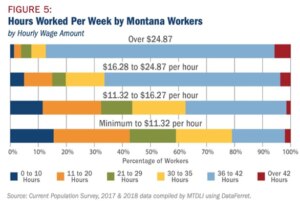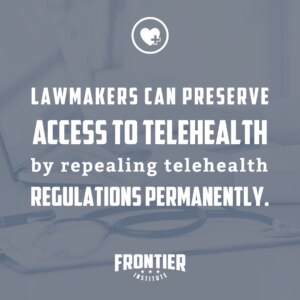Biden’s new minimum wage
Forcing tradeoffs between zero and $15 will not make our state better off.
“The minimum wage law is very cleverly misnamed. The real minimum wage is zero—and that is what many inexperienced and low-skilled people receive as a result of legislation that makes it illegal to pay them what they are currently worth to an employer.” – Thomas Sowell
President Biden is making headlines in his call for nearly doubling the federal minimum wage to $15 per hour. With Montana’s minimum wage sitting at $8.75 per hour, a $15 federal minimum wage be a 71% increase.
Around 9,000 workers currently make the minimum wage in Montana, many of them in the food industry: waiters/waitresses, fast food etc. These sorts of workers are typically younger, have less education and less working skills. As this graph shows, a sizeable amount of those workers are on the job less than 20 hours per week:

What happens to these part time, less educated and less skilled workers under a $15 federal minimum wage? The CBO has estimated upwards of 3.7 million jobs would be eliminated nationwide.
Mandating higher wages increases the opportunity cost for businesses to employ workers, making ones that can work more or contribute more skills more valuable. Sadly, that also means it’s the part-time workers on the margins are the first to go.
I often think back to my time at college in Bozeman, working a minimum wage job as a waiter to pay for my rent as I attended classes. Between time spent on classes and homework, I could only work around 15 hours per week.
Would I have been one of the part-time workers laid off under a $15 minimum wage?
Many workers today in Montana could be facing similar prospects. Forcing tradeoffs between zero and $15 will not make our state better off.
For Liberty,
Kendall Cotton
The Latest
- Earlier today, the Frontier Institute went to the capital to support HB 43, a bill proposed by Representative Rhonda Knudsen of Culbertson which follows our recommendationsto permanently eliminate regulations waived during the coronavirus outbreak which increased telehealth access and helped lower costs. Check out our statement of support.

- Another bill to keep your eye on: HB 231 from Rep. Matt Regier of Kalispell, which follows Frontier Institute’s recommendations for lawmakers to repeal Montana’s Certificate of Need (CON) program. Under the CON program, the government gets to determine if a new health care business is “needed”, a process that has been shown to limit healthcare competition which could give Montanans more choices and lower costs. The Frontier Institute will be supporting this bill!
- Don’t miss Sen. Cary Smith’s great op-ed which details how permanently authorizing Direct Patient Care can help drive down healthcare costs. We are proud to stand with Sen. Smith in support of his bill SB 101.
